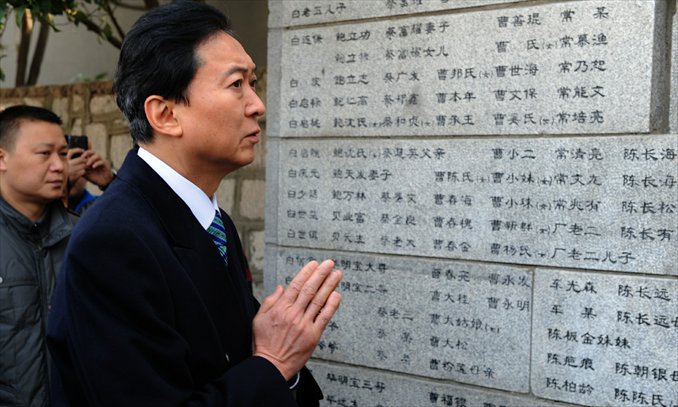Former Japanese PM prays at Nanjing memorial

Former Japanese prime minister Yukio Hatoyama on Thursday offered a silent prayer at the Nanjing Massacre Memorial Hall, which is dedicated to victims of a mass killing by the Japanese army during World War II.
The gesture won instant praise from the Chinese public, but his comments that territorial disputes do exist over the Diaoyu Islands were rebuffed by the Japanese government as "opposite to Japan's position."
"I apologize for the crimes that Japanese soldiers committed during wartime and I sincerely hope this tragedy will not repeat," Hatoyama said during his visit to the memorial in Nanjing, Jiangsu Province, where 300,000 Chinese people are believed to have been killed during Japanese occupation. Hatoyama is the third former Japanese prime minister to visit the memorial hall in Nanjing after Toshiki Kaifu and Tomiichi Murayama.
At a time when China-Japan relations are locked in a simmering territorial row, Hatoyama's stance provided a change of tone, though some have cautioned that it's only a private visit that does not represent the Japanese government.
Chinese people will only take the olive branch if Japanese Prime Minister Shinzo Abe "acts the same as Hatoyama," one Weibo user wrote.
In a meeting with Chinese officials on Wednesday, Hatoyama said, "there is a dispute" between Japan and China over the sovereignty of the Diaoyu Islands in the East China Sea.
The remarks are "clearly opposite to Japan's position," Japan's chief cabinet secretary Yoshihide Suga said on Thursday, according to the Kyodo News Agency. "It is extremely regrettable that a person who served as premier made such comments."
The Yomiuri Shimbun said Hatoyama's comments and behaviors may result in misunderstandings (of Japan's policy) in the international community and may sabotage Abe's diplomatic efforts to restore Japan-China relations. It said the Chinese government may take advantage of Hatoyama's remarks.
"Hatoyama's visit will help little in unfreezing China-Japan relations," said Zhou Yongsheng, a professor of Japan's diplomacy at the China Foreign Affairs University. "Hatoyama's view can't be taken as the view of Japan's ruling Liberal Democratic Party (LDP)."
"The Japanese government has been taken hostage by the irrational and harmful nationalist sentiments in Japan's civil society," Zhou told the Global Times. "But if Japan can accept China's patrols and turn its focus to East Asia free trade talks, both countries will benefit."
Natsuo Yamaguchi, the leader of Japan's New Komeito Party, a key ally of the LDP in Japan's coalition government, announced on Thursday that he will pay a four-day visit to China from Tuesday in a bid to "initiate talks between China and a ruling party of Japan."
Abe was on Thursday paying a visit to Thailand, as part of a Southeast Asia tour to boost economic ties with countries in this region and to contain China's growing influence.
China's foreign ministry spokesman Hong Lei Thursday again urged the Japanese government to "recognize historical facts and the current situation and resolve issues through dialogue and discussion."
The US assistant secretary of state Kurt Campbell, who was visiting Japan on Thursday, also called for the Japanese government to make great efforts to improve relations with China and South Korea.
However, in talks with the US ambassador to Japan, the hawkish Japanese defense minister Megumi Onodera said Japan's self-defense force had "remained restrained" in dealing with Chinese planes flying close to airspace over the Diaoyu Islands.
In response, a Chinese defense ministry official said the Chinese military has kept "maximum restraint" toward the frequent harassment of Chinese maritime surveillance planes by Japanese military jets.
The US and Japan on Thursday began working-level talks on revising bilateral guidelines on defense cooperation, which will focus on strengthening cooperation between the two allies in monitoring and surveillance activities in East Asia and will also cover the issue of lifting a constitutional ban on Japan's use of collective self-defense rights, Xinhua reported.
Agencies contributed to this story